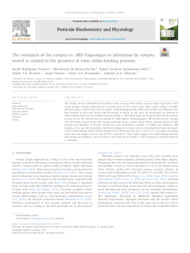The resistance of the cowpea cv. BRS Xiquexique to infestation by cowpea weevil is related to the presence of toxic chitin-binding proteins.
The resistance of the cowpea cv. BRS Xiquexique to infestation by cowpea weevil is related to the presence of toxic chitin-binding proteins.
Author(s): FERREIRA, S. R.; ROCHA, M. de M.; SILVA, K. J. D. e; FERREIRA, A. T. S.; PERALES, J.; FERNANDES, K. V. S.; OLIVEIRA, A. E. A.
Summary: The cowpea weevil (Callosobruchus maculatus) is the main pest that attacks cowpea (Vigna unguiculata) seedsb during storage, causing nutritional and economic losses in the cowpea crop. Thus, studies aiming to identify resistant cowpea cultivars have been developed. Chitin-binding proteins (CBP), such vicilins and chitinases, have been detected in seeds and related with the toxicity to insects. In this work, we investigated the presence of chitin-binding proteins in the partially resistant cowpea cv. BRS Xiquexique and evaluated their toxicity towards cowpea weevil. The CBP fraction was isolated by chitin affinity chromatography. CBP fraction showed, through 15% SDS PAGE, protein bands with varying molecular masses, mainly below 55 kDa.
Publication year: 2021
Types of publication: Journal article
Unit: Embrapa Mid-North
Observation
Some of Embrapa's publications are published as ePub files. To read them, use or download one of the following free software options to your computer or mobile device. Android: Google Play Books; IOS: iBooks; Windows and Linux: Calibre.
Access other publications
Access the Agricultural Research Database (BDPA) to consult Embrapa's full library collection and records.
Visit Embrapa Bookstore to purchase books and other publications sold by Embrapa.

